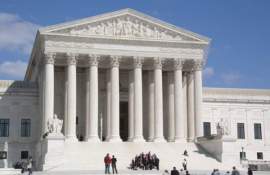
Who Is Melville Fuller

Popular In Constitution
Purpose Of Lifetime Appointment And Pros And Cons Enumerated Powers Bicameral Legislature Background Article 3 Of The Constitution We The People 1st Amendment Who Wrote The Constitution Judicial Review Equal Protection Clause 5th Amendment 10th Amendment Three Fifths Compromise
Melville Fuller assumed the role as Chief Justice of the U.S. Supreme Court in 1888, after the death of Morrison Waite who was operating as Chief Justice at the time. He ideally was not the first candidate for Chief Justice, as the former Ambassador of Great Britain was rumored to be first runner-up.
The official announcement of Fuller as Chief of Justice was mentioned in the summer of 1888. Many important decisions were set in place while Melville Fuller served as Chief Justice. One being most notable as the Separate but Equal Clause.
The case of Cadwell vs. Texas in 1891 was one major instance where the famous phrase "Equal Justice Under Law" was put into effect. Although the phrase had been in existence since its development in 1832, Melville Fuller used this phrase to express his views of "equal and impartial justice". Under his ruling the controversial phrase "separate but equal", stemming from the equal and impartial justice clause, brought justification to segregation which originated in the South.
The controversial case of Plessy v. Ferguson was a defining moment for the Separate but Equal Clause. The Court ruled that segregation was not discrimination and facilities that were separated by race did not violate the Constitution so long as the facilities were equal.
Another case that complied to the "separate but equal" beliefs of Melville Fuller was the 1904 Gonzalez v. Williams case. Under this case, the Court ruled that Puerto Ricans were not considered aliens and could not be denied entrance into the United States. Although citizenship of Puerto Ricans were not automatically determined, Melville Fuller did recognize Puerto Rico as an extended U.S. territory, allowing those who originated from Puerto Rico to stay in the United States without fear of being deported.
Under the direction of Fuller, the Court also addressed the income tax law declaring some measures of applied taxes unconstitutional. This was the ruling in the Pollack v. Farmers Loan & Trust Co case. During this case, the Supreme Court ruled that the additional taxes applied to interest, dividends and rent stemming from the Income State Tax Act of 1984 unconstitutional. In other cases, he ruled against applied taxes to telegraph messages and applied rules regarding interstate commerce.
During the term of Melville Fuller as Chief Justice, the economy of the United States was under full growth. This growth lead Melville Fuller to make many decisions regarding taxes and interstate commerce for business practices. The Separate but Equal Clause helped establish the functions of segregation. His rulings set the standards for each State to comply to separate but equal practices when setting up facilities.
Many thought highly of the implementations set by Fuller. He was thought of as a skillful chief leader who was energetic and fair. Fuller was even involved in cases providing rulings in the disputes between other countries. His ruling helped direct a nation that was once filled with racism and unfair practices into a realm of more acceptance. He also helped establish better business practices for the growing United States economy.
NEXT: Who Is Roger Taney





















